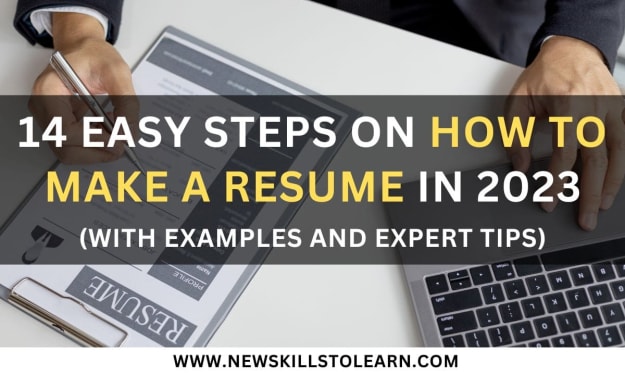10 Most Common Resume Mistakes (And How To Avoid Them)
Improve Your Resume by Avoiding These Common Mistakes

Originally published at www.newskillstolearn.com
When it comes to crafting the perfect resume, it's essential to make sure that you avoid making any mistakes.
Unfortunately, there are a lot of common resume mistakes that can be made, which can have a significant impact on your job prospects.
In this blog post, we will discuss the 10 most common resume mistakes and provide helpful tips on how to avoid them.
With these tips, you can ensure that your resume is as effective as possible in helping you land your dream job. When it comes to crafting the perfect resume, it's essential to make sure that you avoid making any mistakes.
Unfortunately, there are a lot of common resume mistakes that can be made, which can have a significant impact on your job prospects.
In this blog post, we will discuss the 10 most common resume mistakes and provide helpful tips on how to avoid them.
With these tips, you can ensure that your resume is as effective as possible in helping you land your dream job.
1) Don't use an unprofessional email address
One of the biggest resume mistakes you can make is using an unprofessional email address.
An email address such as [email protected] or [email protected] reflects poorly on your professionalism and can detract from the impact of your resume.
Use a professional email address that includes your name such as [email protected] Instead of using numbers, words, or phrases in your email address, use a combination of your name and relevant keywords.
This will ensure that your email address looks appropriate when hiring managers review your resume.
When creating your professional email address, avoid using words that could be seen as inappropriate.
Some words to avoid in resume applications include vulgarity, slang, profanity, and any other type of inappropriate language.
If possible, include your full name to create an email address that looks more professional.
This will help create a more positive impression and make it easier for recruiters to find your resume.
2) Keep it simple
It is important to keep the design and content simple when writing a resume.
You should avoid using complicated words, overly formal language, or long phrases.
Your resume should be clear and easy to read. Stick to action-oriented language and use words that you can easily explain in an interview.
Some words to avoid include “bespoke”, “detail-oriented”, and “proactive”.
Using these words may make your resume look more impressive on paper, but they won’t actually say anything concrete about your skills or experiences.
You should also avoid embellishing your resume with information that isn’t true or relevant.
Examples of resume mistakes that involve lying include claiming to have worked at a job longer than you actually did, inflating your GPA, or fabricating awards or honors.
Instead of trying to impress potential employers with flowery language or false information, focus on making your skills and experiences shine through your resume.
3) Don't lie
One of the biggest mistakes you can make when writing a resume is lying.
It is never okay to exaggerate or fabricate information to make yourself seem more qualified for a job than you really are.
This is especially true for details such as your education and work experience.
Not only does lying on your resume create an untrustworthy impression but it can also be easily uncovered by employers who check references or background information.
Here are some examples of resume mistakes that involve lying:
• Inflating job titles
• Fabricating work experience
• Exaggerating accomplishments
• Falsifying education
• Stretching dates of employment
To avoid these types of resume mistakes, make sure that you are honest and accurate when presenting your qualifications.
Instead of exaggerating or fabricating information, focus on using words that accurately describe your experiences and abilities.
Avoid using words like “expert” or “excellent” to describe yourself, as this can make you seem disingenuous.
4) Don't use fancy fonts or images
When writing your resume, it's important to stay away from using any fancy fonts or images.
Not only can these make it difficult to read, but they can also take away from the professional impression you're trying to give.
Stick to a plain font like Arial or Times New Roman that is easy to read. Avoid using words like "creative," "innovative," and other flashy words that can come across as unprofessional.
Additionally, avoid using any abbreviations or words to avoid in resumes such as "LOL" or "TTYL."
These may seem harmless, but employers might view them as unprofessional.
5) Stick to a standard format
One of the most common resume mistakes is not sticking to a standard format.
Many applicants make the mistake of making their resumes too creative or trying to stand out by using fancy fonts or images.
This can actually be a big turn-off for employers and make it difficult for them to quickly skim through your resume.
The best way to ensure your resume looks professional and consistent is to use a standard format. Try to use a format that is commonly used and accepted in your field.
Resume Mistakes Examples:
Examples of resume mistakes that occur when you don't stick to a standard format include:
Using fonts or graphics that are too distracting, using over-the-top colors and designs, using unnecessarily long sentences, using too many buzzwords and jargon, and trying to cram too much information into one page.
Words to Avoid in Resume:
In addition to avoiding certain types of formatting mistakes, it's also important to avoid certain words and phrases in your resume.
Try to avoid phrases like “very experienced”, “highly motivated”, or “results-driven” as these don't add any value or insight into your qualifications.
Instead, focus on concrete experiences or skills that prove you have what it takes for the job.
6) Use action words
When writing your resume, you want to make sure it stands out from the competition. One way to do that is by using action words.
Action words are short and descriptive phrases that demonstrate what you accomplished in previous positions.
Using action words is important because it shows potential employers what you’re capable of.
It’s also important to avoid resume mistakes such as using too much passive language.
Instead of saying “I was responsible for” or “I handled,” use active words like “implemented,” “executed” or “managed.”
Here are some examples of how to use action words effectively:
• Developed and managed a customer service program that increased customer satisfaction by 15%
• Created and executed social media campaigns that increased website traffic by 25%
• Implemented a new inventory system that reduced costs by 10%
• Conducted regular training sessions to ensure compliance with regulations
By using action words, you can demonstrate to employers that you have the skills and experience necessary to be successful in the role.
It also helps avoid resume mistakes by being specific and avoiding overly passive language.
Keep in mind that this isn’t an exhaustive list; there are many other action words you can use in your resume.
With careful consideration and practice, you can make sure your resume stands out from the rest!
7) proofread
No matter how hard you work on your resume, you may be making a significant mistake if you don't proofread it.
Even the smallest typos can be costly when applying for a job, so make sure to read over your resume multiple times before submitting it.
It also helps to have someone else read through it to catch any mistakes that you might have missed.
Examples of resume mistakes due to lack of proofreading include misspelled words, incorrect grammar, and formatting issues.
Taking the time to ensure that everything is correct can go a long way in helping your resume stand out.
8) Don't make it too long
One of the most common resume mistakes is submitting a document that is too long.
Your resume should be concise, focusing on your experience and qualifications that are most relevant to the job you’re applying for.
The goal of your resume is to provide an overview of who you are and what you bring to the table, not an exhaustive list of every single job or accomplishment you’ve ever had.
For example, if you’re applying for a job as a graphic designer, you don’t need to include all of your customer service jobs from 10 years ago.
Focus on the work experience that most closely relates to the position you’re seeking. When in doubt, leave it out. Anything more than two pages is probably too long.
Remember, hiring managers don’t have time to read a book about you; they want to know quickly what makes you the right fit for the job.
9) Tailor it to the job you're applying for
Making sure to tailor your resume to the job you’re applying for is one of the most common resume mistakes examples.
A resume should be custom-fit to each job that you apply for, highlighting the skills and qualifications that are most relevant.
Make sure that you review each job posting carefully and make a list of the keywords, requirements, and responsibilities they list.
Then, make sure that these items appear on your resume in a prominent place.
If a hiring manager sees that you haven’t made an effort to tailor your resume to their job posting, it can be a major turn-off.
10) Adding references
When you’re applying for a job, having references can make a world of difference in helping you stand out from the competition.
However, not all references are created equal, and it’s important to choose ones that will reflect positively on your candidacy.
Here are some resume mistakes examples to consider when selecting your references:
1) Don’t include references who don’t know you or your work well. It’s essential that your references can speak to your skills, experiences, and qualifications.
2) Don’t use references that have a conflict of interest with your potential employer.
For example, if you’re applying to work at a restaurant, don’t list the owner of a competing establishment as a reference.
3) Don’t list more than three references. It’s perfectly acceptable to have fewer than three, but listing too many may make it look like you don’t have enough quality references to choose from.
4) Don’t forget to obtain permission from your references before listing them.
You should also provide them with a copy of your resume and job description so they can be prepared for any potential calls from potential employers.
By avoiding these common mistakes and taking the time to select the right references,
You’ll be able to provide potential employers with the information they need to determine if you’re the right fit for their position.
Conclusion
The most crucial component of your job search is your resume. You must make sure it looks professional and is error-free.
A well-crafted resume will give you the best chance of being noticed by potential employers.
By following these tips and avoiding the common mistakes listed above, you can help ensure your resume stands out from the crowd and gets the attention it deserves. Good luck!
About the Creator
New Skills To Learn
newskillstolearn.com that will help you build your perfect career. Check out our comprehensive guide to learning new job skills, life skills, and more. Get started on building the perfect career with our comprehensive guide!






Comments
There are no comments for this story
Be the first to respond and start the conversation.